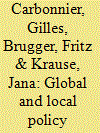|
|
|
Sort Order |
|
|
|
Items / Page
|
|
|
|
|
|
|
| Srl | Item |
| 1 |
ID:
104435


|
|
|
|
|
| Publication |
2011.
|
| Summary/Abstract |
The global governance of extractive resources has largely been shaped by the energy-security agenda of industrialized countries. It is patchy and does not properly address the specific concerns of producer, consumer, and transit countries. Rising demand coincides with a looming peak of oil production and climate change. This requires urgent and resolute collective action, which is hampered by a disconnect between geological and political temporality and realities. Extractive industries, investors, civil society, international organizations, and consumer countries can jointly provide significant political and market incentives to avert the resource curse in resource-rich, but weak states. This calls for an appropriate institutionalization of voluntary multistakeholder initiatives with greater engagement on the part of emerging economies.
|
|
|
|
|
|
|
|
|
|
|
|
|
|
|
|
| 2 |
ID:
104444


|
|
|
|
|
| Publication |
2011.
|
| Summary/Abstract |
This article examines the most significant international policy responses that seek to address the resource trap and spur development in resource-rich, but fragile states. It applies a regime theoretical framework to assess recent multistakeholder initiatives within the extractive sector by focusing on the processes through which they seek to alter the behavior of public and private organizations. Based on a review of the Nigerian and Azeri cases, the article finds that civil society often does not have the capacity to live up to the high expectations placed on it by these initiatives. The effectiveness and eventual success of multistakeholder initiatives in the extractive sector require exploring alternative pathways to affect behavior of key actors. Stronger market incentives and regulation can provide the conditions required for extractive activities to result in positive development outcomes.
|
|
|
|
|
|
|
|
|
|
|
|
|
|
|
|
| 3 |
ID:
136970


|
|
|
|
|
| Summary/Abstract |
The dependence on oil, gas, and mineral exports arguably has a negative impact on economic growth in resource-rich, developing countries. This article looks at the impact of resource dependence on adjusted net savings (ANS) as an indicator of weak sustainability. Our results, based on a panel of 104 developing countries during the recent commodity price boom, confirm a negative relationship between resource extraction and sustainable development as measured by ANS. We further look at the specific role of armed conflict and armed violence as captured by the homicide rate. Armed conflict, which is positively associated with resource dependence, negatively affects ANS per capita according to both our OLS and instrumental variables (IV) estimates. Similarly, armed violence has a detrimental effect on sustainable development. Our IV estimate suggests that a one-point increase in the homicide rate decreases ANS per capita by $60. Since education expenditures are a critical ANS component, we further examine the impact of resource dependence and violence on human capital. Consistent with previous findings, resource-dependent countries underinvest in education but armed conflict and violence do not affect the instantaneous share of education expenditures, hinting at a detrimental effect working through physical and social capital rather than education.
|
|
|
|
|
|
|
|
|
|
|
|
|
|
|
|
| 4 |
ID:
188413


|
|
|
|
|
| Summary/Abstract |
This study explores the impact of random changes in risk perceptions that occur as a result of terrorist attacks by examining abnormal variations in defence sector valuations. Using a market model event study methodology, the market impacts of three different sets of terror events are measured: Mass casualty events, events that occur in OECD countries, and events that occur in BRICS countries. The findings are tested against a series of explanatory variables that capture characteristics of the domestic defence sector for 21 country-level sector indices and characteristics of the event itself. Results demonstrate that the response of the defence sector to terror events depends more on event characteristics than economic characteristics, contrary to much of the prevalent literature. We also find that speculation in the defence sector persists for several days following an attack indicating that investors broadly expect a military response, particularly in the case of mass casualty events.
|
|
|
|
|
|
|
|
|
|
|
|
|
|
|
|
|
|
|
|
|